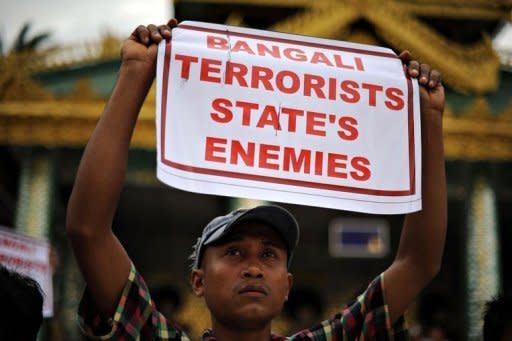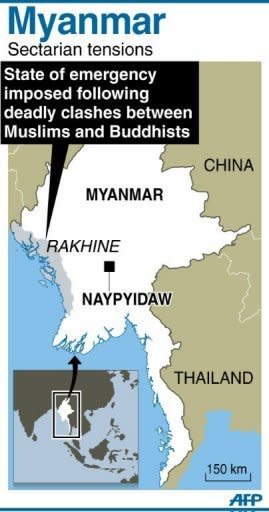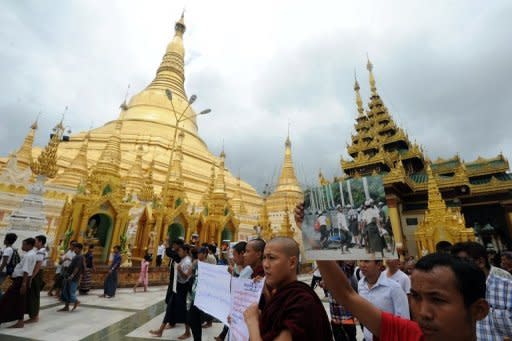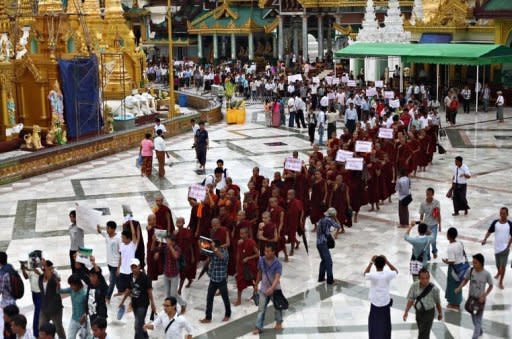Troops patrol strife-hit Myanmar state
Security forces tried to restore order on Monday to a Myanmar state placed under emergency rule after a wave of deadly religious violence, as the United Nations evacuated foreign workers. The surge in sectarian unrest presents a major test for President Thein Sein, a former general credited with pushing through a series of dramatic political reforms since the end of decades of military rule last year. In Sittwe, the capital of western Rakhine state, AFP reporters saw the charred remains of houses as well as troops outside monasteries and mosques. Groups of men, who appeared to be ethnic Rakhine Buddhists, roamed the city wielding sticks or knives. Most of the shops were closed and the authorities have announced a dusk-to-dawn curfew. On the outskirts of Sittwe, where large fires blazed, gunfire was heard after police entered one village. Large crowds of residents, some armed with swords and knives, were seen patrolling their community. Rakhine, which is predominantly Buddhist, is home to a large number of Muslims including the Rohingya, a stateless people described by the United Nations as one of the world's most persecuted minorities. A cycle of apparent revenge attacks has gripped the state following the recent rape and murder of a Rakhine woman, allegedly by three Muslims. In response an angry Buddhist mob beat 10 Muslims to death earlier this month. At least seven people have died in clashes since Friday and 500 homes have been destroyed, according to officials, but there were fears of a higher toll. Chris Lewa, the Bangkok-based director of The Arakan Project, an advocacy group which works with Rohingya, said she had received reports that dozens of people had been killed. AFP was unable to verify the information. "The authorities, not just Burmese media, seem to ignore all the Muslim deaths," Lewa said. The Myanmar government considers the Rohingya to be foreigners, while many citizens see them as illegal immigrants and view them with hostility, describing them as "Bengalis". Neighbouring Bangladesh has stepped up security along the frontier and in refugee camps where tens of thousands of Rohingya live. Border guards on Monday turned away eight boats carrying more than 300 Rohingya. "They were carrying mainly Rohingya women and children, many of whom were crying and looked extremely anxious," Shafiqur Rahman, a major in the Border Guard Bangladesh (BGB) force, told AFP. "All eight boats have been pushed back to Myanmar territory." The United Nations began pulling out more than 40 workers -- including foreigners -- and their families from a base in Maungdaw, in Rakhine state, said Ashok Nigam, UN resident and humanitarian coordinator in Yangon. The temporary move was "because of the insecurity and disturbance", he said. Local Buddhists and the Rohingya have traded increasingly angry accusations over the eruption in violence. "We tried hard to resist them but our houses and monastery were burned down by Bengalis," said Soe Tun, a 53-year-old Buddhist villager sheltering at a monastery just outside Sittwe. "I had never seen this kind of violence in 30 years." Abu Tahay, of the National Democratic Party for Development, which represents the Rohingya, said a number of Rohingya had been shot dead by security forces or killed by Buddhists. "I'm still worried because there are racist Rakhine people. They don't believe in peaceful cohabitation," he said by telephone from Yangon. US Secretary of State Hillary Clinton urged an immediate end to the violence. "The United States continues to be deeply concerned about reports of ongoing ethnic and sectarian violence in western Burma's Rakhine State and urges all parties to exercise restraint and immediately halt all attacks," Clinton said in a statement. "We urge the people of Burma to work together toward a peaceful, prosperous and democratic country that respects the rights of all its diverse peoples." Thein Sein warned in an address to the nation Sunday that attacks fuelled by "hatred and revenge based on religion and nationality" in Rakhine could spread to other parts of the country, and that the unrest threatened to undermine reforms. Myanmar's Muslims -- of Indian, Chinese and Bangladeshi descent -- account for an estimated four percent of the roughly 60 million population in a country where for many people Buddhism forms an intrinsic part of national identity. According to the UN, there are nearly 800,000 Rohingya living in Myanmar, mostly in Rakhine. Another one million or more are thought to live in other countries.





